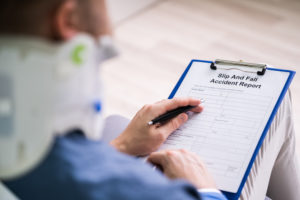Should I Call My Insurance if it Wasn’t My Fault?
In the aftermath of a car wreck that wasn’t your fault, navigating the maze of insurance procedures and determining the best course of action can be daunting. You may find yourself questioning whether it’s necessary to contact your insurance company and what implications it may have on your claim.
To shed light on this matter and unravel the intricacies involved, our Richmond car accident lawyers delve into the crucial factors that can influence your decision. By exploring the potential benefits, protections, and considerations at play, we aim to provide clarity and empower you with the knowledge needed to make informed choices following a non-fault car wreck.
Does Your Accident Qualify as a No-Fault Claim?
Insurance adjusters employ various methods to determine fault in an accident. While their specific assessment may vary depending on the circumstances and the insurance company’s procedures, here are some ways insurance adjusters can discern that an accident is not your fault:
Police Report
Insurance adjusters often rely on the police report filed at the scene of the accident. If the report clearly states that the other party involved in the accident was at fault, it can serve as strong evidence in your favor.
Witness Statements
If there were witnesses to the accident, their statements can be crucial in establishing fault. Insurance adjusters may interview witnesses and gather their accounts of the incident to corroborate your version of events and support your claim that you were not at fault.
Photos and Videos
Visual evidence, such as photographs or videos taken at the scene, can provide valuable insights into the accident. If you have documented the accident with clear visuals that demonstrate the other party’s fault, it can significantly strengthen your case.
Damage Assessment
Insurance adjusters analyze the damage to the vehicles involved in the accident to determine how the collision occurred. Based on the severity and location of the damage, they can often ascertain which party was at fault.
Traffic Laws and Regulations
Insurance adjusters are well-versed in traffic laws and regulations. They may review these laws and examine whether any violations were committed by the other party involved in the accident. If the other party’s actions violated traffic laws, it can indicate their fault in the collision.
Recorded Statements
During the claims process, insurance adjusters may request recorded statements from the involved parties. Your statement detailing your account of the accident can help establish that you were not at fault.
Comparative Negligence Assessment
In some jurisdictions, comparative negligence laws apply, which means fault can be assigned to multiple parties based on their respective degrees of negligence. Insurance adjusters will assess the evidence to determine the level of fault, if any, on each party involved.
Insurance adjusters will conduct a thorough investigation to gather all available evidence before making a final determination of fault. Regardless, fault doesn’t impact if you should contact the insurance company following an accident.
For a Free Legal Consultation
Call The Personal Injury Lawyer Hotline.
804-250-5050
Should I Notify My Insurance Company Even if the Accident Wasn’t My Fault?
Yes, it is generally advisable to notify your insurance company even if the accident wasn’t your fault. Most insurance policies require policyholders to promptly report any accidents or incidents, regardless of fault. Notifying your insurance company allows them to initiate the claims process, gather necessary information, and provide guidance on the next steps.
Let the Heavy Hitters® Take On Your Case 804-250-5050
Why Should I Notify My Insurance Company if I’m Not at Fault?
Notifying your insurance company serves several purposes. First, it ensures that your insurance company is aware of the accident and can provide support and guidance throughout the claims process.
Second, it helps protect your rights and interests, as your insurance company can act as your advocate in dealing with the other party’s insurance company.
Lastly, even if you are not at fault, your insurance policy may still provide coverage for certain damages or expenses, such as medical bills or rental car costs.
Central Virginia's Top Rated Personal
Injury Lawyers 804-250-5050
Will My Insurance Premiums Increase If I Report an Accident That Wasn’t My Fault?
In most cases, reporting an accident that wasn’t your fault should not directly result in an increase in your insurance premiums, but some states don’t prohibit insurance agencies from increasing rates after a no-fault wreck.
Insurance companies typically base premium adjustments on factors such as your driving history, claims history, and overall risk profile. However, it’s important to review your policy and consult with your insurance provider to understand how they handle such situations.
Let Us Be The Heavy Hitters® For Your Case Speak To An Attorney Now
What Information Should I Provide to My Insurance Company When Reporting an Accident?
When reporting a no-fault accident to your insurance company, provide accurate and detailed information about the incident. This includes the date, time, and location of the accident, as well as a description of what happened.
Additionally, provide the contact information and insurance details of the other party involved, if available. Be prepared to answer any questions your insurance company may have to assist them in processing your claim effectively.
Do I Need to Deal With the Other Party’s Insurance Company if I Notify My Own?
If you notify your insurance company about the accident, they may handle communication and negotiations with the other party’s insurance company on your behalf. Your insurance company can act as your representative and protect your interests during the claims process.
However, it’s important to stay informed and involved in the process.
What If the Other Party’s Insurance Company Contacts Me Directly?
If the other party’s insurance company calls you directly, it’s generally advisable to be cautious in providing information. Since it is safe to contact your insurance if an accident wasn’t your fault, you can inform them that you have reported the accident to your insurance company and provide them with your insurance agency’s contact information.
It’s usually best to let your insurance company handle communications with the other party’s insurer to ensure your rights and interests are protected.
Seeking Legal Advice for Issues with Insurance Companies
Yes, if you encounter difficulties or disputes with insurance companies, seeking legal advice is recommended. An experienced personal injury attorney can review your case, assess the insurance company’s handling of your claim, and provide guidance on the appropriate course of action.
Contact us to protect your rights, negotiate on your behalf, and ensure you receive fair compensation for any damages or losses resulting from the accident.
The Pendleton Law Team Is Here For You 804-250-5050



